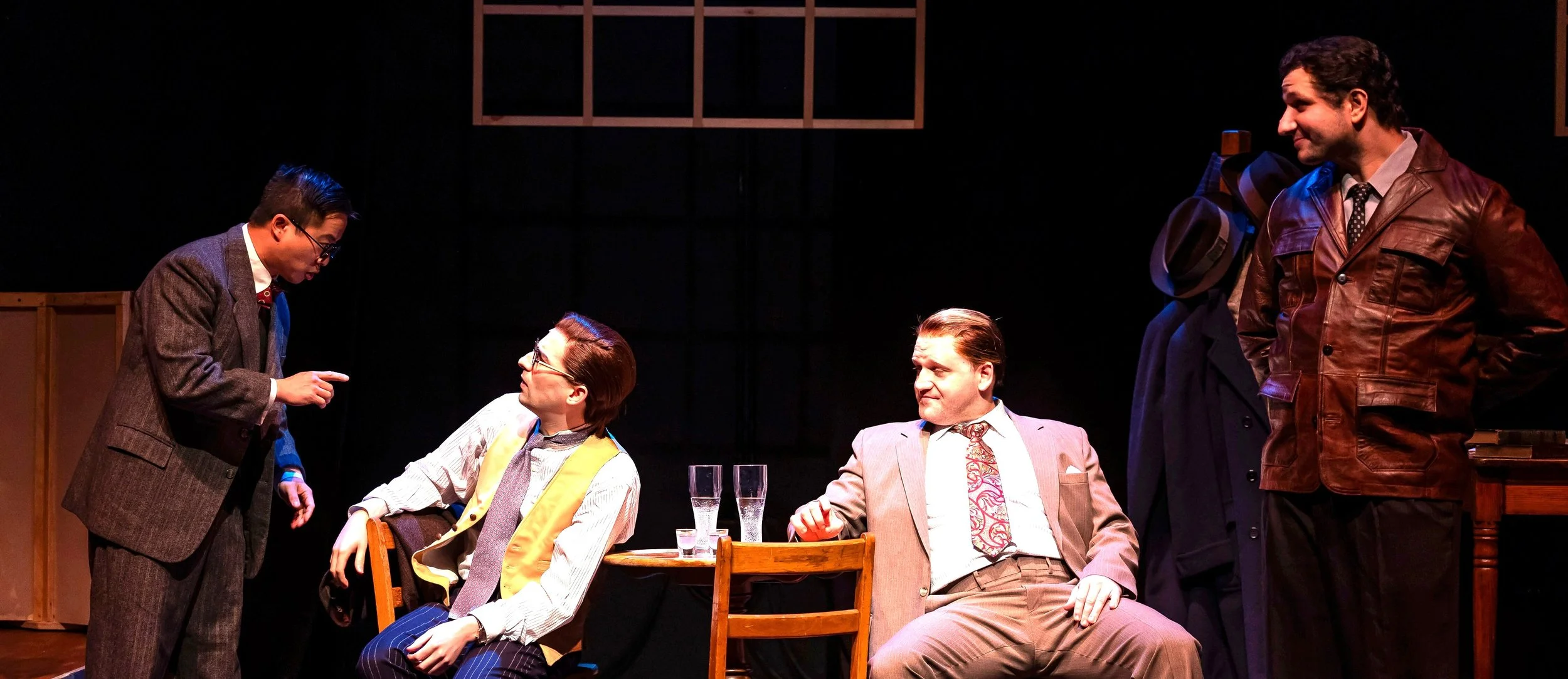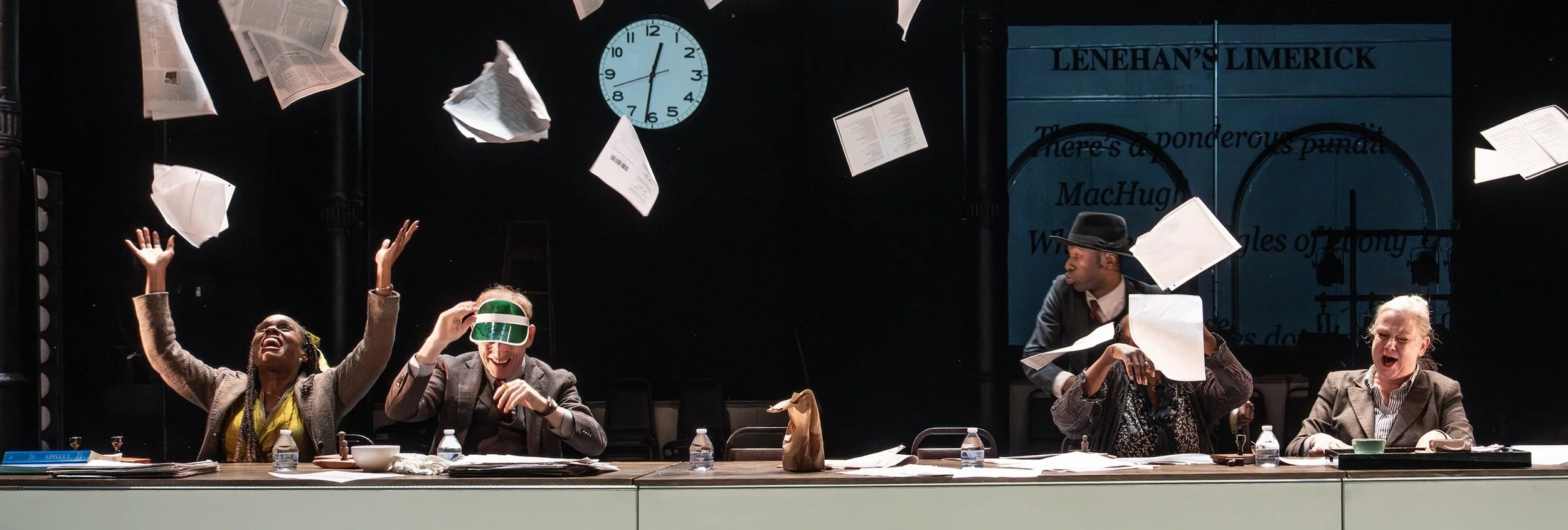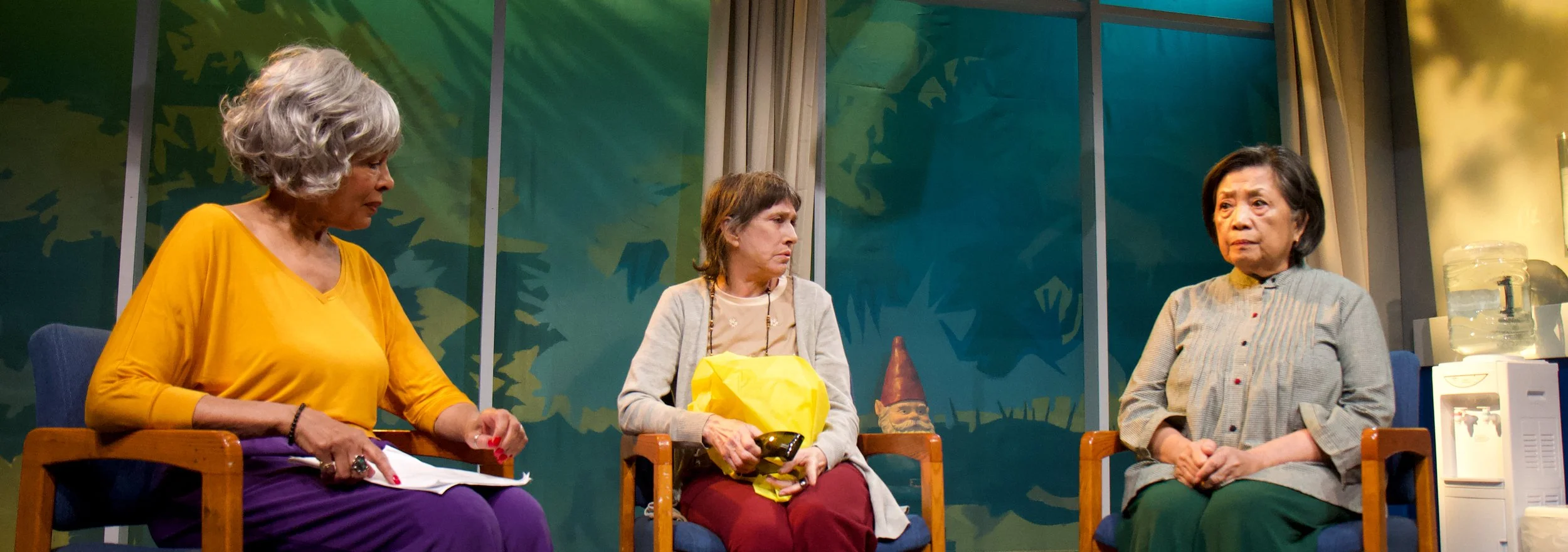The Holocaust is never light fare for anyone, and it may be presumptuous to say, but its darkness is no more acutely felt than by those who survived it. The Congress for Jewish Culture’s production of Night Stories: Four Tales of Reanimation dramatizes the Yiddish poems of Avrom Sutzkever, widely acknowledged as the most eloquent Holocaust poet. Sutzkever’s poems, which depict the ghetto in Vilnius, Lithuania, under Nazi occupation, reflect the emotional roller coaster of its residents’ existence, pivoting among horror, humor, and an ambivalent desire for both death and redemption.
Predictor
Playwright Jennifer Blackmer takes great pains to jazz up a history lesson in Predictor, her tribute to the unheralded woman who created the home pregnancy test, Meg Crane. The chronological account of Crane’s invention is interspersed with musical and joky skits, as well as scenes representing Crane’s thoughts or flashbacks in her life.
Tartuffe
Molière’s Tartuffe is robustly reimagined by Lucas Hnath in a randy new version directed by Sarah Benson, turning the classic comedy of hypocrisy into a breathless, contemporary satire. With choreography by Raja Feather Kelly and a fearless cast led by Matthew Broderick and David Cross, the production unleashes ferocious wit and gleeful buffoonery.
Anna Christie
Anna Christie,Eugene O’Neill’s 1922 Pulitzer Prize drama, has been overshadowed by his late, great behemoths: Long Day’s Journey into Night and The Iceman Cometh are more often seen than the briefer play. Yet Thomas Kail’s enthralling production at St. Ann’s Warehouse makes a strong case for this neglected earlier work.
Picnic at Hanging Rock
The 1975 Australian film Picnic at Hanging Rock unfurls an atmospheric, unsettling little story of mysterious forces disturbing the titular outing, enjoyed by students at a Victoria, Australia, girls’ school circa 1900. In the movie, director Peter Weir keeps the proceedings eerie and foreboding as some of the girls on the picnic just vanish, leaving their classmates and the school personnel baffled and devastated. A well-deserved international success, Picnic at Hanging Rock grips the viewer even as not a lot happens: the film is all mood. The emotions are strong, but nothing about it screams, “I need to be sung.”
Gotta Dance
Gotta Dance, conceived by Nikki Feirt, is a choreographic musical revue of dances from Broadway shows—all performed by an expert cast of performers who sing and dance. The production, codirected by Feirt and Randy Skinner, flows well, and each number benefits from being staged by someone who had intimate knowledge of the original.
Everything Is Here
Peggy Stafford’s Everything Is Here explores the later stage of the life cycle—what some call the golden years, and others call the twilight years—by focusing on three women in their 70s: Bev (Jan Leslie Harding), Bonnie (Petronia Paley) and Janice (Mia Katigbak). Living in senior housing, they find their days are punctuated by the visiting nurse, Nikki (Suzannah Millonzi), who has a sadness beneath her cheerful demeanor, and the lanky and handsome Grant (Pete Simpson), who leads meditation and mindfulness classes at the home while he auditions for acting roles.
It’s a Wonderful Life! A Live Radio Play
When Frank Capra’s It’s a Wonderful Life premiered a few days before Christmas in 1946, New York Times reviewer Bosley Crowther was not exactly filled with glad tidings. “The weakness of this picture,” he bah-humbugged, “is the sentimentality of it—its illusory concept of life.” He observed that the small-town denizens represented in the film, “all resemble theatrical attitudes rather than average realities.” In a return engagement of Irish Repertory Theatre’s It’s a Wonderful Life! A Live Radio Play, Anthony E. Palermo’s adaptation of the film’s screenplay unapologetically leans into the sentimentality and accentuates the theatrical attitudes to deliver a sparkling and joyful Yuletide delight.
Laowang: A Chinatown King Lear
Titles, even subtitles, sway playgoers’ expectations. Take, for instance, a recent press performance of Laowang: A Chinatown King Lear. Alex Lin’s new farcical melodrama zips relentlessly around jocose hairpin turns. The dialogue, stylishly delivered by a first-rate cast, is witty, urbane, and frequently arch. Yet the audience—presumably anticipating King Lear or something akin to that monumental tragedy—sat in suspended, churchlike repose throughout the play’s early scenes.
Diversion
Playwright Scott Organ excels at creating characters whose mistakes in their jobs and relationships lead to agonizing consequences. His 2020 drama, 17 Minutes, was a harrowing tale of a sheriff’s deputy in a crumbling marriage who failed to stop a mass shooting. For his new work, Diversion, Organ reunites with director Seth Barrish and the Barrow Group to focus on a close-knit nursing unit on the verge of unraveling. This quiet and absorbing think piece examines the hardship of opioid addiction and the post-traumatic stress of the COVID-19 pandemic.
The Surgeon and Her Daughters
Set in New York City—specifically Times Square and Ozone Park, Queens—The Surgeon and Her Daughters presents a powerful story of seemingly unrelated people whose lives are upended as they struggle with insecurity and grief. Chris Gabo’s script artfully follows characters who struggle, deceive, fight, joke, and hope while reckoning with what their lives have become. Director Adrienne Campbell-Holt skillfully guides the production for maximum cathartic effect.
Meet the Cartozians
Two different views of immigration and assimilation hold sway in Talene Monahon’s Meet the Cartozians. Directed and expertly cast by David Cromer, the first half of Monahon’s play finds a naturalized Armenian American defending his citizenship in a landmark court case in 1925. In the second part, set a century later, the Armenian community has both thrived and splintered.
What If They Ate the Baby?
In the U.S. premiere of What If They Ate the Baby? writer-performers Xhloe Rice and Natasha Roland spin a seemingly polite 1950s housewife visit into a hilariously sinister dance of casseroles, secrets, and suburban dread. This queer clown two-hander uses absurdist comedy to probe surveillance, paranoia, and the pressures of American womanhood.
Gruesome Playground Injuries
Put two single beds side by side, and the stage is set for a romantic comedy. But what if they are hospital beds? Could a depressing drama be on tap? Not to worry. Rajiv Joseph’s 2009 oddity, Gruesome Playground Injuries, returns to Off-Broadway with plenty of laughs, missed connections, and fleeting kisses. And when things do, on occasion, turn grim, the solid acting, ample stage blood, and traces of vomit make this piece more of a shocker than a bummer. In the reliable hands of veteran director Neil Pepe, it’s a slice-of-life one-act with the emphasis on slice.
The Baker’s Wife
The musical The Baker’s Wife has had a notoriously checkered history. With a book by Joseph Stein and music and lyrics by the young Stephen Schwartz, it first appeared in 1976. But, amid casting changes (Patti LuPone survived) and infighting, producer David Merrick closed it before it got to Broadway. Over the years it has had many iterations, in hopes of correcting whatever sank it then (critics excoriated the book but praised the music). LuPone’s song “Meadowlark” has become a standard for cabaret singers. The current revival at the Classic Stage Company (CSC), boasting a stellar cast, is likely to be its best shot at resuscitation.
The Seat of Our Pants
Adapting a Thornton Wilder play into a musical has notable historical precedents. His 1954 comedy, The Matchmaker, was, of course, the basis for Hello, Dolly! And in 1955, Our Town was transformed into a live television musical starring Frank Sinatra. Now comes The Seat of Our Pants, based on Wilder’s wildest work, his 1942 Pulitzer Prize–winner, The Skin of Our Teeth. Under the direction of Leigh Silverman, with book and score by Ethan Lipton, this faithful interpretation gets by on novelty in the first act, thrives on its merits in the second, and offers hope, if not structure, in the third.
Practice
In his play Practice, Nazareth Hassan delivers an uncomfortable yet unflinching depiction of what it takes for an artist to achieve his vision, allowing director Keenan Tyler Oliphant to stage a powerful production that the script fully earns. The story follows a group of actors and an ascendant theater star, Asa Leon, who subjects them to a rigorous development process for his next project. Asa pursues his vision with messianic dedication, drawing his actors into that vision without regret or apology. The result is distressing, at times brutal, and ultimately thrilling.
Wake
Grief is very personal, and everyone processes it in their own way and in their own time. Elisabeth Kübler-Ross identified five stages of grief: denial, anger, bargaining, depression, and acceptance. Wake, written by Leon Ingulsbrud and Brooke Shilling, explores the contours of these stages through music, dialogue, musings, reflections, and poetry.
Archduke
If the title of Rajiv Joseph’s latest play, Archduke, conjures up Franz Ferdinand, the most famous archduke of all, that’s exactly what’s intended. But Joseph is less concerned with the death of the Serbian monarch whose assassination in 1914 sparked World War I than he is with the social and historical forces that helped radicalize the three principal killers: Gavrilo Princip, Nedeljko Čabrinović, and Trifko Grabez.
Pygmalion
In his current revival of Pygmalion, director David Staller does more than remount Shaw’s 1912 comedy—he alters the play’s architecture by adding a mythic framing device led by four Olympian gods who introduce and comment on the action. This addition is not found in the published script, and theatergoers expecting a traditional revival may consider it a provocation. But Staller positions it as a reclamation rather than an invention.


























